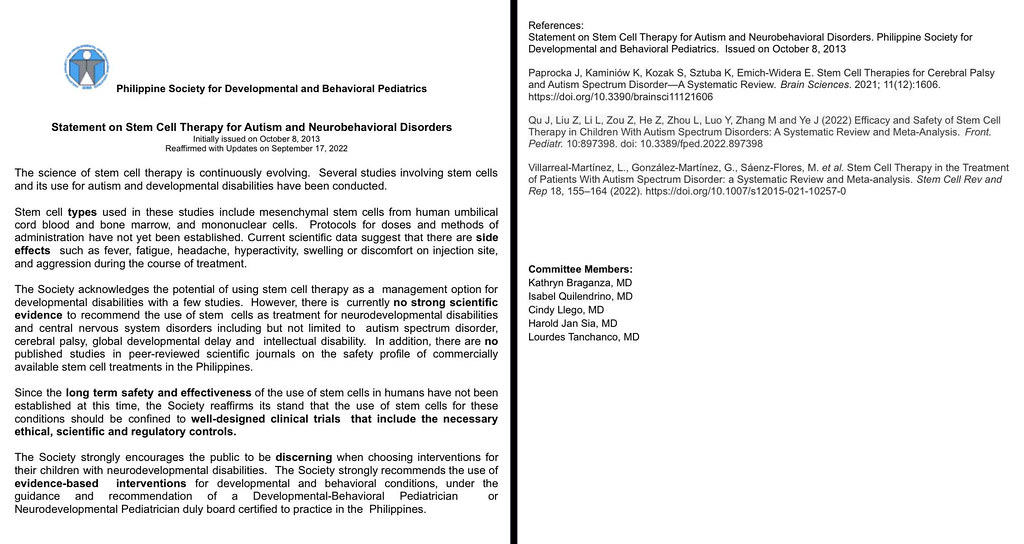Initially issued on October 8, 2013
Reaffirmed with updates on September 17, 2022
The science of stem cell therapy is continuously evolving. Several studies involving stem cells and its use for autism and developmental disabilities have been conducted.
Stem cells types used in these studies include mesenchymal stem cells from human umbilical cord blood and bone marrow, and mononuclear cells. Protocols for doses and methods of administration have not yet been established. Current scientific data suggest that there are side effects such as fever, fatigue, headache, hyperactivity, swelling or discomfort on injection site, and aggression during the course of treatment.
The Society acknowledges the potential of using stem cell therapy as a management option for developmental disabilities with a few studies. However, there is currently no strong scientific evidence to recommend the use of stem cells as treatment for neurodevelopmental disabilities and central nervous system disorders including but not limited to autism spectrum disorder, cerebral palsy, global developmental delay and intellectual disability. In addition, there are no published studies in peer-reviewed scientific journals on the safety profile of commercially available stem cells treatments in the Philippines.
Since the long term safety and effectiveness of the use of stem cells in humans have not been established at this time, the Society reaffirms its stand that the use of stem cells for these conditions should be confined to well-designed clinical trials that include the necessary ethical, scientific and regulatory controls.
The Society strongly encourages the public to be discerning when choosing interventions for their children with neurodevelopmental disabilities. The Society strongly recommends the use of evidence-based interventions for developmental and behavioral conditions, under the guidance and recommendation of a Developmental-Behavioral Pediatrician or Neurodevelopmental Pediatrician duly board certified to practice in the Philippines.
References:
Statement on Stem Cell Therapy for Autism and Neurobehavioral Disorders. Philippine Society for Developmental and Behavioral Pediatrics. Issued on October 8, 2013.
Paprocka J, Kaminiow K, Kozak S, Sztuba K, Emich-Widera E. Stem Cells Therapies for Cerebral Palsy and Autism Spectrum Disorder-A Systematic Review. Brain Sciences. 2021; 11 (12): 1606. https://doi.org/10.3390/brainsci11121606
Qu J, Liu Z, Li L, Zou Z, He Z, Zhou L, Luo Y, Zhang M and Ye J (2022) Efficacy and Safety of Stem Cell Therapy in Children with Autism Spectrum Disorders: A Systematic Review and Meta-Analysis. Front. Pediatr. 10:897398. doi: 10.3389/fped.2022.897398
Villarreal-Martinez, L., Gonzalez-Martinez, G., Saenz-Flores, M. et. al. Stem cell Therapy in the Treatment of Patients with Autism Spectrum Disorder: a Systematic Review and Meta-Analysis. Stem Cell Rev and Rep 18, 155-164 (2022). https://doi.org/10.1007/s12015-021-10257-0
Committee Members:
Kathryn Braganza, MD
Isabel Quilendrino, MD
Cindy Llego, MD
Harold Jan Sia, MD
Lourdes Tanchanco, MD
Read the statement from the Philippine Society for Developmental and Behavioral Pediatrics that was read by Dr. Alexis Reyes on 27 October 2013 at the Philippine National Autism Conference, after an enlightening presentation by Dr. Antonio Dans on “The Truth About Stem Cell Therapy.” https://bit.ly/484MK3K






0 comments:
Post a Comment